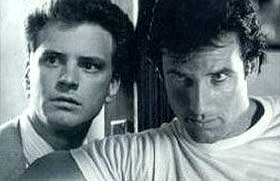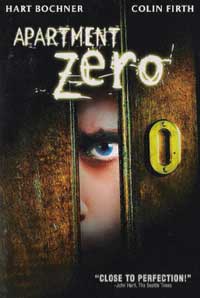The homoerotic art thriller Apartment Zero (1988) is halfway a twisted romance & the rest a horrific mystery thriller, set largely in an elegantly decaying apartment building of down-&-out &/or aging expatriot eccentrics & expatriots in Buenos Ares.
Director Martin Donovan is not the fine American actor of the same name, but an Argentine-born director who had been doing primarily television direction before this film. His television work never hinted that he had such a unique film in him.
With a timeless color-noir darkness & beauty that makes it seem impossible that it was made in 1988, Apartment Zero seems to fresh & modern. Were I a filmmaker I'd study this one to better understand how it visually succeeded in this fashionable a-fashionability that doesn't age.
A grudging hit on the film festival circuit in 1989 & 1990 when it took a number of festival "best" awards in France, Italy, Seattle, & Washington D.C., even the festival freaks often seemed befuddled by it. It never attracted American distribution, & remained one of those semi-obscure things that a few people loved to distraction & many more couldn't find. Now that it has an excellent Criterion dvd it should have "a second coming" bigger than the first.
 Adrian (Colin Firth), an introverted film nerd without friends hides his loneliness under contempt for others, visits his mother in an asylum trying to relate to her as in the past though she's completely senile. His repertoiry cinema is doing almost no business & he's desperate for funds. Adrian (Colin Firth), an introverted film nerd without friends hides his loneliness under contempt for others, visits his mother in an asylum trying to relate to her as in the past though she's completely senile. His repertoiry cinema is doing almost no business & he's desperate for funds.
Financially he has no choice but to try to rent out his mother's empty bedroom. After interviews with nightmare candidates, there's no question but that Frank (Hart Bochner) has got to be his roomy, having as he does the look & demeanor of a James Dean, smouldering & dangerous & irresistable.
The sexual tension between them is ferocious, though it will never get beyond the co-dependent brotherliness. Adrian delights in ironing, pressing, folding Jack's shirts, & getting up early enough to prepare him a nice breakfast each morning. He tells Frank he hopes not to be taken for too much of a Felix Ungar, who Frank never heard of.
Frank is a chameleon who conquers his way through the building's numerous loonies or eccentrics, being the perfect friend or fantasy lover for each in turn. With his intense gaze & by rarely speaking except in the most platitudinous terms, he's a blank slate on which an old lady or a drag queen can project their own fantasy.
Frank is so pleasantly sexily thuggish that at first it seems he must be a con artist who sizes people up & becomes a different dream-man for each of them, male or female, with some purpose in mind, probably robbery, possibly murder.
But as Adrian's possessiveness & jealousy grows, one begins to wonder if Jack has no identity of his own, & what he gets from his series of masks is recognition in other peoples' eyes. Maybe he's not dangerous at all, but only the chameleon, & it's Adrian who might go over the edge.
Striding the margins of bleak black comedy, it's too terrifying for outright laughs. Adrian seems to understand he could at any moment find himself victimized by a man who so quickly recognizes repressed desire, who on their first meeting intentionally rather than coincidentally stood next to Adrian's framed photograph of James Dean, & has been playing similar stunts for everyone in the apartment house.
Everyone in the building knows, & loves, a slightly different Frank. It's maddening to Adrian that his roomy is befriending fellow tenants after Adrian had for so long & assiduously cultured a distance between his life & theirs. As perfect friends go, Frank can be awfully disturbing, & Adrian's greatest fear is that he might suddenly move out.
Even as Adrian learns that Frank isn't the man he pretends to be, & as his paranoid tendencies worsen, when it comes down to it, the only thing he can ask of Frank is to please keep the mask on forever & never leave him. Frank smiling like James Dean assures him they're friends for life.
The subtle ways Frank disrupts the entire building is much more intriguing than the thriller that develops as the film progresses. It's almost disappointing when it turns into a tale of an American soldier of fortune who might or might not have been a hired assassin for the former Argentine government's death squads (active until a scant five years before this film was made).
Claudia (Francesca d'Aloja), who takes tickets at Adrian's theater, is part of a citizen's activist group doing research on & tracking down death squad war criminals. She wants Adrian to rent out the cinema in the day time to her activist group, which has lots of film documentation to go through & can make use of the screen as well as the space for their meetings.
Adrian is by no means political -- he lives in his own geeky imaginary world of classic Hollywood cinema. He doesn't want his theater misused politically; it's not "pure." But eventually finances are so bad he lets Claudia rent the cinema for their meetings. And while sorting through miles of film footage of death squad activities trying to identify scores of faces involved, Claudia eventually recognizes Adrian's roommate.
This thriller component takes over the film for only about twenty minutes or so, drawing the story seemingly in a whole new direction resembling many another thriller. Frank has secret meetings, is paid off apparently to help get him out of the country, heads for the airport, discovers that Adrian's passport which he stole & altered is no longer current, kills a man more or less at random by means of easy seduction to get his passport, but the passport is too bloodied to use.
So he's going to have to return to Adrian's apartment for safe sanctuary, & as easily as that the movie is back on its former track, but with a lot of new information shaping the meaning & outcome of Jack & Adrian's relationship.
He arrives just in time to save Adrian from being killed by the united lunatic mischief of the tenants who'd irrationally convinced themselves Adrian was the serial killer much in the news & had done in Frank who they all loved. How surprised they are to see Frank just saunter on in!
As Frank with needle & thread sews up Adrian's head injury, the story mostly flips back to its previous mode of their weird co-dependency. Only now we've seen "Frank" with his mask off, & he's a man very afraid of being captured as a war criminal, & willing to kill just about anyone who threatens his well-being.
After he kills Claudia, he begs Adrian not to abandon him, & the power equation seems to have reversed. it's the first we realized that Frank was just about as needy as Adrian, that their dependency indeed runs both ways.
He promises to clean up the blood & mess, put his mask back on, & everything will be as it was before. Adrian stands horrified & silent, drawn between wanting the chameleon to revert to the sexiest best friend he ever had or ever will have, or fleeing in terror to the police.
The film continues to descend into chaos & madness. I'm not sure the shock ending, which owes a little bit to Hitchock's Psycho, is nearly as intense & strange as the film as a whole. The performances are electrifying, the emotional landscape of the characters much more harrowing than the gunplay, & so richly textured that the film bares revisiting once in a while because there's always something else to find in it. This is "artsploitation" at its finest.
copyright © by Paghat the Ratgirl
|

 Adrian (Colin Firth), an introverted film nerd without friends hides his loneliness under contempt for others, visits his mother in an asylum trying to relate to her as in the past though she's completely senile. His repertoiry cinema is doing almost no business & he's desperate for funds.
Adrian (Colin Firth), an introverted film nerd without friends hides his loneliness under contempt for others, visits his mother in an asylum trying to relate to her as in the past though she's completely senile. His repertoiry cinema is doing almost no business & he's desperate for funds.